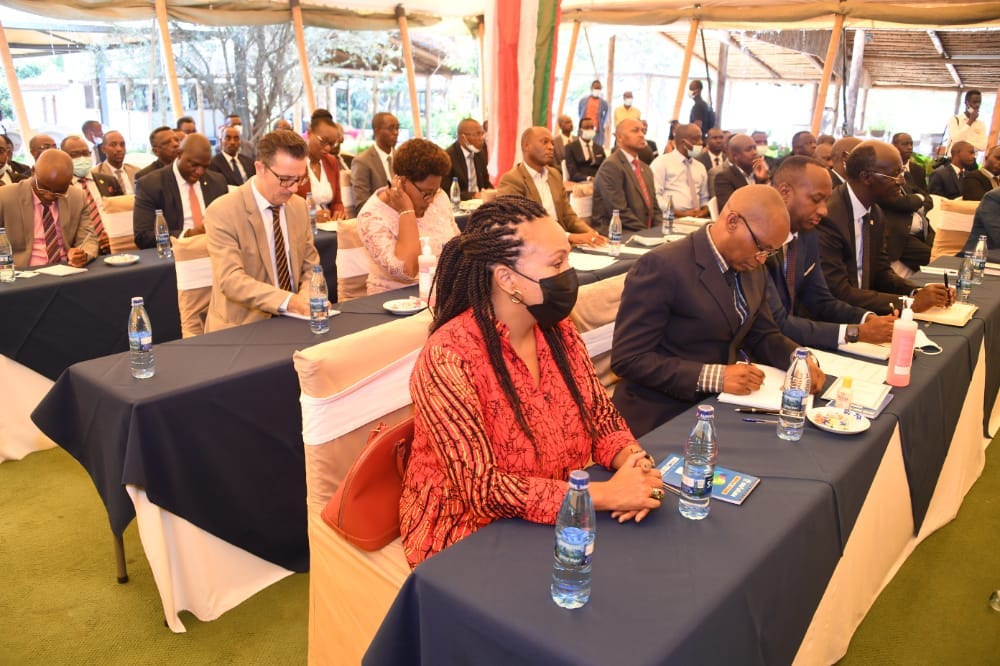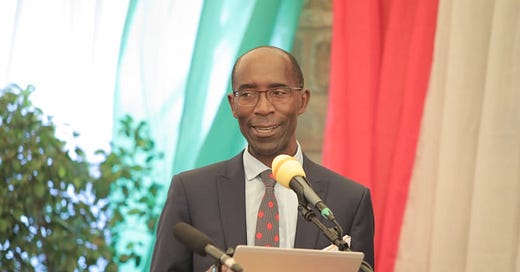Key takeaways from the 1st high-level Conference on challenges of Burundi's Development
RegionWeek Newsletter Vol V, Issue #189 | Saturday, August 21, 2021
This is RegionWeek Newsletter( for the 5th Season (July-December 2021). The content targets Business leaders, Decision-makers, and Young professionals with interests in Burundi and East Africa. Subscribe to stay productive, and competitive in a pandemic and disrupted season.
This is the free briefing version to participate and get to the Zoom Briefing session, you need to join our Premium member Club. (Please contact +25771939153, WhatsApp, Telegram).
The Zoom Briefing session is an opportunity to ask questions about news stories covered by RegionWeek & Partners and to hear from experts on various topics of Interest for Burundi and East Africa.
Dear RegionWeek Readers,
On the shore of Lake Tanganyika in Bujumbura, La Banque de la Republique du Burundi, (the Central Bank of Burundi) organized this Friday the First high-level meeting on the challenges of Burundi’s Development. It was a unique opportunity for Burundi's top leaders, Public Sector key Players, Researchers, and other Burundi’s financial partners to reflect together on what needs to be done to turn Burundi’s economic potential into economic growth. These are the key takeaways from the conference:
1.Challenges do exist, but it is our duty to find the solutions.
In his opening remarks, President Evariste Ndayishimiye said that the country's economic recovery is a duty that falls especially on the most educated. He indicated that Burundi’s development, the increasing number of educated people, and productive work should go hand in hand, for him that is the ultimate solution. President Ndayishimiye called on Burundian experts in the diaspora to contribute to the sustainable development of their homeland, without always waiting for compensation and other incentives.
Among highlighted challenges, the Head of State recognized that the education system of Burundi is experiencing difficulties. He revealed the government's intention to reform it to adapt to the reality of the moment in order to achieve the development of the country.
“Burundi has all the potential to develop economically. We must work in synergy because dispersion cannot solve our problems " said Evariste Ndayishimiye
On cooperation, President Evariste Ndayishimiye reiterated his commitment to work with Burundi's technical and financial partners. "We promise, we won’t betray you" he concluded.

2.Transforming economic potential into economic, effective, sustainable, and inclusive growth
Introducing his presentation Professor Leonce Ndikumana discussed the fact that it will first be necessary to make an honest diagnosis of the potential in order to "know where we are, where we are going and how or want to get there".
For him, to manage the challenge of public debt, it would be necessary to collect more internal revenues (taxes), improve the environment for external financing, attract more foreign direct investments, spend more efficiently (efficient allocation of resources).
He stressed that to address the challenges of structural transformation at the Agricultural sector level, agricultural productivity should be increased by increasing public (including infrastructure) and private funding, innovation, and technological modernization.
At the mining sector level, he noted that it would be necessary to invest in prospecting, he insisted on including all stakeholders, to negotiate the management of the exploitation of mining sites, to develop the value chain, to strengthen human capacities, to exploit regional and international partnerships.
"In negotiating contracts, you need science. You need competent people," explained Prof. Leonce Ngendakumana
According to Ndikumana, with the drying up of foreign flows, the government of Burundi should finance itself from local resources. At the Private Sector level, whether for the informal sector which is often forgotten while it is the sector that produces more jobs and the formal sector, surveys should be carried out to identify opportunities and potentials.
“The private sector is the development lung of the country. The government draws the vision and supports this sector(….)The government must consider it as its partner", insisted Leonce Ngedakumana.
To reduce public debt, we must collect more domestic revenue, create a favorable business environment, improve the environment for external financing, better manage the revenue collected.
3.The challenges of economic growth and potential for recovery
In his presentation, Dr. Janvier D. Nkurunziza spoke about the state of play, the challenges of the Burundian economy given that the goal is to reach the level of middle-income and then emerging countries within 20 years.
The possible causes of the low growth rate of Income/inhabitants are the high demographic pressure, low accumulation of capital, limited means of financing, institutional weaknesses, repetitive political crises. Dr. Janvier D. Nkurunziza suggested a round table with all stakeholders on the Burundian economy in order to chart the way for the achievement of growth objectives within 20 years.
"The amount of money a citizen earns in Burundi is still small", according to Dr. Désiré Nkurunziza, some of the reasons are population growth, low-income generation, poor planning, and more.
The Expert reports that the study he conducted, in order to have Burundi reach the level of other developed countries, it is required that the revenue per Burundian income increase by an average of 8 percent, Burundian annual income would be between $ 1,026 and $ 4,000. That would coincide with the government's goal of reaching that milestone in 20 years.
Among challenges highlighted by participants, MP Jean Marie Nibirantije spoke about the interest rates on bank loans which are very high and which block the implementation of development projects. On the other hand Dr. Ir. Sanctus Niragira, Rector of the University of Burundi, mentioned the lack and the access to statistics that can serve as a basis for research in Burundi. For him, a culture of statistics is needed in order to be able to help policymakers better chart the path of development.
The Bottomline
The Governor of the Central Bank Jean Ciza underlined the fact that the question of the development involves various actors who must interact in harmony and in perfect coordination on at least four dimensions that converge: the public and private sectors on the one hand, internal and external on the other hand.
Referring to the challenges related to the promotion of economic growth in Burundi, he reminded that the Bank of the Republic of Burundi has introduced, since 2019 new measures aimed at supporting, through appropriate refinancing mechanisms, credit institutions, in this case, banks and microfinance institutions, in order to encourage them to further support the financing of growth sectors.
At the end of the conference, it was suggested the establishment of a national development policy coordination superstructure to manage and support the strategy of the Burundian government.
Thanks for reading
Fabrice Iranzi, Editor in Chief | RegionWeek.com
RegionWeek is an Independent media project based in Burundi that needs resources to operate at its full potential. You can contribute now, and help the RegionWeek team to publish consistently. Your Contribution VIA ECOCASH +25771939153





